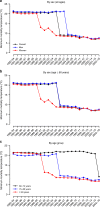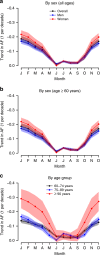Reversal of the seasonality of temperature-attributable mortality from respiratory diseases in Spain
- PMID: 32433517
- PMCID: PMC7239891
- DOI: 10.1038/s41467-020-16273-x
Reversal of the seasonality of temperature-attributable mortality from respiratory diseases in Spain
Abstract
A growing number of epidemiological studies have recently assessed temporal variations in vulnerability and/or mortality attributable to hot and cold temperatures. However, the eventual changes in the seasonal distribution of temperature-attributable mortality remain unexplored. Here, we analyse countrywide daily time-series of temperature and mortality counts from respiratory diseases by sex, age group and province of residence during the period 1980-2016 in Spain. We show the complete reversal of the seasonality of temperature-attributable mortality, with a significant shift of the maximum monthly incidence from winter to summer, and the minimum monthly incidence from early and late summer to winter. The reversal in the seasonal distribution of the attributable deaths is not driven by the observed warming in both winter and summer temperatures, but rather by the very large decrease in the risk of death due to cold temperatures and the relatively much smaller reduction due to hot temperatures. We conclude that the projected decrease in the number of moderate and extreme cold days due to climate warming will not contribute to a further reduction of cold-attributable respiratory deaths.
Conflict of interest statement
The authors declare no competing interests.
Figures





References
-
- Intergovernmental Panel on Climate Change. Climate Change 2014: impacts, adaptation, and vulnerability. Part A: global and sectoral aspects(Cambridge Univ. Press, 2014).
-
- Ballester, J., Robine, J.-M., Herrmann, F. R. & Rodó, X. Long-term projections and acclimatization scenarios of temperature-related mortality in Europe. Nat. Commun. 2, 358, 1–8 (2011). - PubMed
Publication types
MeSH terms
LinkOut - more resources
Full Text Sources
Medical

